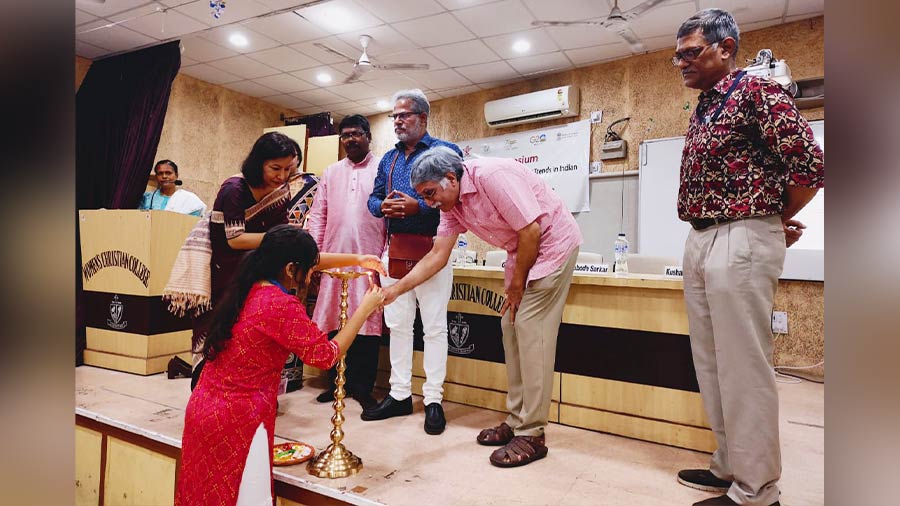Sahitya Akademi, in collaboration with Women's Christian College, Kolkata organised a symposium titled 'Caught between Tongues: Recent Trends in Indian fiction in English' on August 28 with eminent academicians of the city.
The symposium was held to trace the developments in Indian fiction in English in the past half century; to identify the distinct patterns in the mentioned trends, as also the directions in which they are headed; to locate the consonances and disjunctions that complicate the reception of these texts; to examine their constant making and unmaking in a globalized and, increasingly digital context.
The welcome address was delivered by Devendra Kumar Devesh, Sahitya Akademi's Eastern regional secretary. In his address, he said, “Today, there are so many new trends and developments in the humanities and literature. Indian English Literature is not the exception to this. There are many new literary movements in Indian English Fiction. We have a gallery of writers who are writing, translating and transcribing into English. Creativity, translation, transcription, Dalit Literature, Diasporic writing, postcolonial writing, postmodern and feministic writings are emerging speedily in Indian English Fiction. Many authors like Chetan Bhagat, Shobha De, Anita Desai, Kiran Desai have Facebook fan pages and the writers are also active in Twitter and Blog. This helps them to know more about the wants of the audience and helps indirect interaction. Even books are available on e-reading. Many authors publish excerpts of their books online for encouraging sales. However, the Indian English popular fiction portrays the tastes of Indian writers and hence can be analyzed as a cultural study material. Today, we will focus on this vast area or dynamic trends in Indian English fiction. We will hear in detail about these trends from the experts.”
After the opening remarks by Ajanta Paul, principal of Women's Christian College, the inaugural session was held, which was chaired by poet Subodh Sarkar. The prize-winning author Rashmi Narzary delivered the inaugural address, and eminent scholar GJV Prasad claimed in his keynote address that all Indian writing in English was a kind of translation.
“It is the three 'I's - Inquisitivity, Interaction and Inconstancy - that get us caught between tongues. And this leads to a shift in trends in fiction writing. Thus, the prevailing trend in Indian fiction in English is one where we often find a scattering of native expressions, blurring of genré boundaries, with a diverse and inclusive character, and a realistic and relatable appeal. It is also experimental in nature, which breathes a fresh, new perspective into the existing trend,” said Narzary, author of His Share of Sky and Sahitya Akademi award winner.
This was followed by two academic sessions, featuring papers and presentations by Sreetanwi Chakraborty, assistant professor, Amity University, Kolkata; Basudhara Roy, assistant professor, Karim City College, Jamshedpur, Jharkhand; Jaydeep Sarangi, principal, New Alipore College, Kolkata; Kiriti Sengupta, eminent poet, editor, translator; Sobha Chattopadhyay, formerly professor of English, Jadavpur University and Sipra Mukherjee, professor of English, West Bengal State University speaking on issues ranging from recent English fiction of the Indian diaspora, and the vernacular realities of modern Indian fiction, to regional fiction in English translation.
Ajanta Paul, principal of Women's Christian College, Kolkata said, “English is one of the several languages in the polyphony of parlances in the sub-continent and, in that capacity often has to enter into relationships and dialogues with its sister tongues giving rise to larger conversations in the fellowship of literary exchanges.Composed in English, expressing for the most part, an Indian sensibility, set against a regional background, and catering to a global readership Indian Fiction in English is rife with ambivalences necessitating an examination of the same.”
The papers and presentations of both the sessions were attended by an audience of academics. The symposium also featured an exhibition and sale of Sahitya Academy publications, as well as a display and sale of Rashmi Narzary's latest work, 'An Unfinished Search'.
